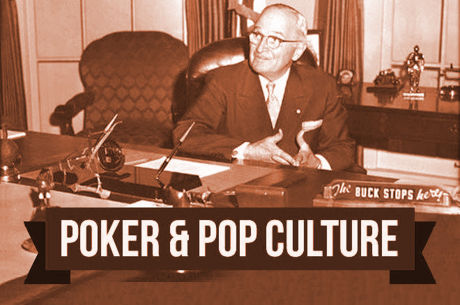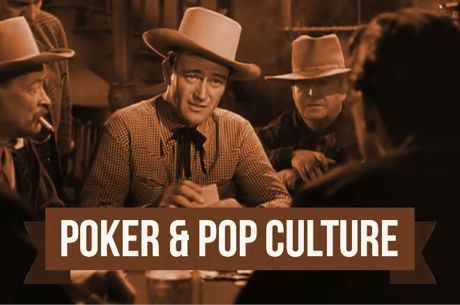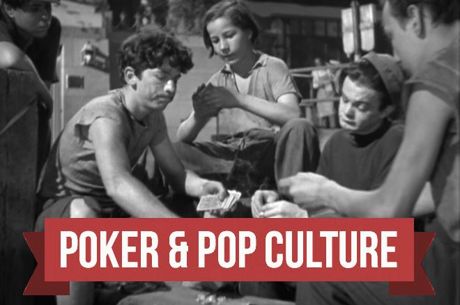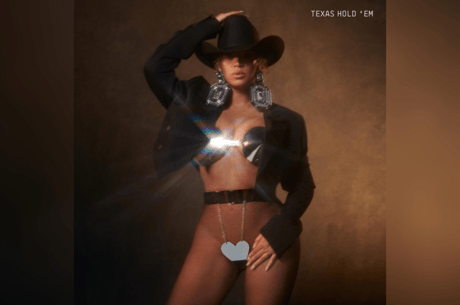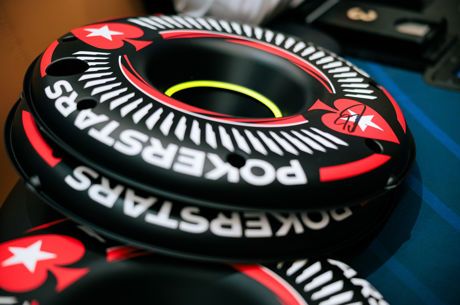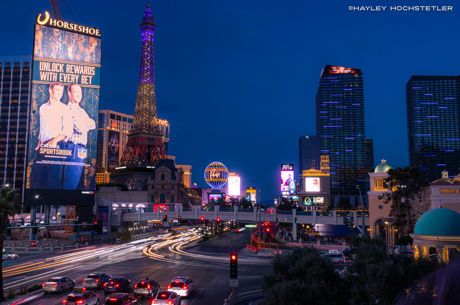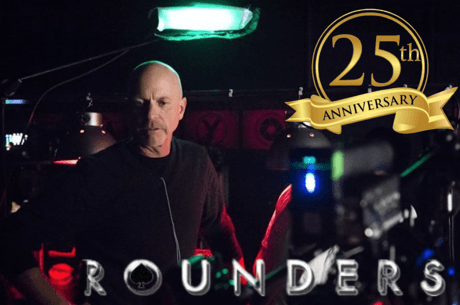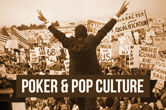Poker & Pop Culture: Joseph McCarthy Overplays the Red Scare Card
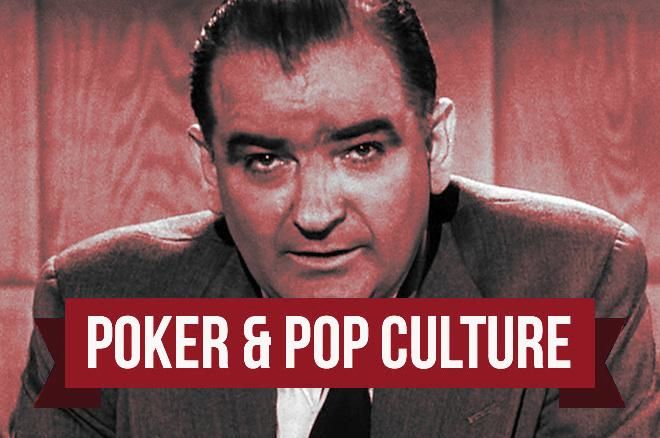
For poker player and later president Richard Nixon, the "red scare" of the late 1940s and 1950s provided an inviting context into which to launch a career in politics.
We discussed last week how the highlight of Nixon's early poker playing days was winning thousands of dollars off of fellow Naval officers while stationed in the south Pacific during WWII. Nixon would use some of those winnings to help fund his first Congressional campaign in 1946. He would also use growing post-war fear about the spread of communism as reason to become an early "cold warrior" known as a strident opponent of the "red menace."
As a young Congressman, Nixon would serve on the House Un-American Activities Committee which had just become a permanent standing committee in the House at the conclusion of the war. The HUAC was charged with investigating various threats to the U.S. government, and during its early years particularly focused on identifying communists or communist sympathizers �� including within the government itself.
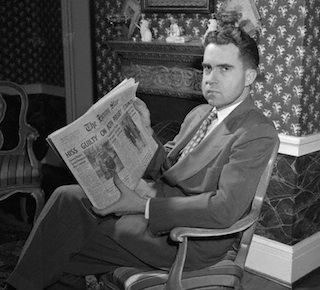
The committee would subpoena citizens to testify, with the hearings sometimes turning into national spectacles as prominent figures from business, entertainment, and elsewhere were grilled about their ideologies and personal connections. Those choosing not to reveal details about their lives in such a setting by pleading the Fifth Amendment were often thought guilty nonetheless, and suffered the consequences by being "blacklisted" by potential employers.
Nixon's star rose considerably thanks to his early involvement in the celebrated Alger Hiss spy case. In 1948 the HUAC received testimony from Whittaker Chambers, then senior editor of Time magazine, who confessed to being a member of the Communist Party of the United States during the 1920s and 1930s and having been a spy for the Soviet Union.
Chambers also identified a number of government officials as having been CPUSA members and/or spies, the most prominent being Hiss who had worked in the State Department, was present with Franklin Delano Roosevelt at the Yalta Conference at the end of WWII, and helped form the United Nations before leaving government to head the Carnegie Endowment for International Peace.
Nixon subsequently led the pursuit of Hiss after he categorically denied charges he'd ever been a communist, and in fact denied he'd ever even met Chambers despite Chambers insisting they had known one another well. Following a complicated, detective-like drama full of twists and turns, Hiss was eventually found to have lied and was charged with perjury, and Nixon emerged from the episode a hero of sorts to opponents of communism.
It had been a risky endeavor for Nixon, with even then-president Harry Truman originally on the side of those defending Hiss. Perhaps in part using his poker skills, Nixon had read Hiss to be "bluffing" in his testimony, and through some good fortune was able to prove his suspicion correct and reap the reward of serious political "chips" to use going forward.
The Rise of Joseph McCarthy
Watching the Hiss case and other HUAC machinations play out was Republican senator Joseph McCarthy of Wisconsin who had first come into office at the same time Nixon did at the start of 1947.
It was only a couple of weeks after the conclusion of the trial in early 1950 at which Hiss was found guilty of perjury that McCarthy delivered what would become his most famous speech. Speaking in Wheeling, West Virginia, McCarthy stunningly claimed to have in his possession a list of communists then working in the State Department. McCarthy is said to have dramatically held aloft a piece of paper containing the list, and just like that the formerly little-known legislator was instantly thrust into the national spotlight.
In his memoirs Nixon suggests it wasn't until after Winston Churchill's famous "Iron Curtain" speech in 1946 (delivered when Nixon was amid his first campaign) that he first became inspired to fight the anti-communist cause. That speech, incidentally, came after a famous poker game played by Churchill, Truman, and others. Neither did McCarthy seem to have been particularly engaged by the issue during his first few years as a senator, but after the "Wheeling speech" he'd become the most vociferous (and most famous) anti-communist legislator of them all.
McCarthy's claim to know the names of government employees who were communists was followed by many more sensational accusations, inaugurating what would come to be known as a second "red scare" era following the earlier one that had followed the Bolshevik Revolution in 1917.
McCarthy would frequently change the number of those he said were on the list, a figure that was reported early on as 205, then 57, then 81. He was also often ambiguous and downright elusive when it came to providing evidence to back his assertions. A senate subcommittee was formed to investigate the charges, and at the committees' hearings McCarthy would accuse still more individuals of being communists.
Like the HUAC hearings, these senate subcommittee hearings became national spectacles, with the "witch hunt" mentality associated with them causing significant consternation and anxiety among Americans and their elected officials. As a result, McCarthy's notoriety continued to grow �� one could say he was following Nixon down a similar path of exploiting fears about communism to build a political career.
A "Demonic" Poker Player
McCarthy had something else in common with Nixon �� he also was an avid poker player. Biographer Arthur Herman tells of a teenaged McCarthy already being devoted to card playing, even losing his truck in a poker game. During the 1930s when in law school at Marquette University, McCarthy apparently also devoted a lot of time to playing poker with his Delta Theta Phi fraternity brothers.
In his 1973 book When Even Angels Wept: The Senator Joseph McCarthy Affair, historian Lately Thomas described McCarthy's competitiveness in school, with boxing and poker being a couple of the contexts in which he would often display the trait. Thomas tells how McCarthy earned respect from others thanks to his intensely "demonic poker playing."
"The game was no pastime to him, but every hand a life-and-death struggle," writes Thomas. "He bluffed so outrageously it was impossible to outguess him, and consequently, when he won, he frequently won big."
Another biographer quoted in an old Poker Player Newspaper piece on McCarthy suggests he did more than just bluff a lot. "He would cheat at cards, and roar with laughter when caught," goes the claim. "It wasn't for the money; he merely wanted to see what he could get away with. Some players were not amused."
McCarthy continued to play poker after graduating law school, and according to Thomas during his first few months as a struggling lawyer "his poker playing managed to keep him going."
Later on after being elected to the Senate, it sounds as though McCarthy experienced a kind of letdown after having accomplished the goal of becoming a senator. Thomas suggests "he kept up his addiction to roughhouse poker" in order to satisfy the urge to compete while feeling otherwise "boxed in."
"Since achieving his goal, he had been without direction," writes Thomas, "flitting restlessly from the frivolous to the dubious... and finding the most congenial outlet for his fiercely competitive energy in marathon sessions of cutthroat poker."
Along came the anti-Communist cause, one which McCarthy would undertake with greater enthusiasm than anyone, being as "demonic" in that pursuit as he'd been with poker. Not only did his new campaign provide an outlet for what proved a dangerous, high stakes variety of competition, but also one in which he would engage in a lot of big-time bluffing, too.
A Blow Against "McCarthyism"
In fact, McCarthy's accusations of others became so obviously compromised by ethical violations and suspect motivations, the entire Senate voted in 1954 to censure him. Indeed, the practice of making accusations of treason or other subversive acts without having supporting evidence would come to be named after the senator �� "McCarthyism."
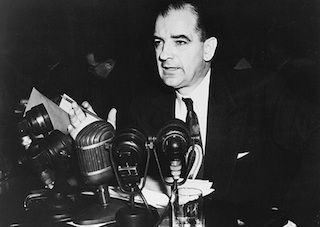
He was charged with failing to cooperate with subcommittee members, as well as with having "repeatedly abused the members who were trying to carry out assigned duties" and for having employed "deliberate deception" and "fraud" when accusing fellow lawmakers of being communists. Having "acted contrary to senatorial ethics" and thus brought "dishonor and disrepute" upon that august body, the Senate voted 67-22 to censure him.
The effect was to make McCarthy politically impotent going forward, and after serving two-and-a-half more years during which most describe him as being a shadow of his former self, he'd succumb to alcoholism and die while still in office at age 48.
By then Nixon was Dwight D. Eisenhower's vice president, and a little over a decade later would be president himself. In a 1983 interview Nixon would tell of how Eisenhower (like many) began to dislike McCarthy's egregious ways and thus sought to distance himself and the Republican party from the senator. Indeed, it was a speech by McCarthy in 1954 in which he suggested members of the Eisenhower's own administration were communists that was the last straw.
"He felt that McCarthy, as he often put it to me, that rather than proceeding as I had in the Hiss case in a way that Eisenhower described as being 'objective' and 'fair' and so forth, that McCarthy was swinging wildly, and that therefore he was doing more harm to the cause than good," explained Nixon.
In other words, when it came to playing the red scare card, McCarthy �� unlike Nixon �� had overplayed his hand.
From the forthcoming "Poker & Pop Culture: Telling the Story of America's Favorite Card Game." Martin Harris teaches a course in "Poker in American Film and Culture" in the American Studies program at UNC-Charlotte.

